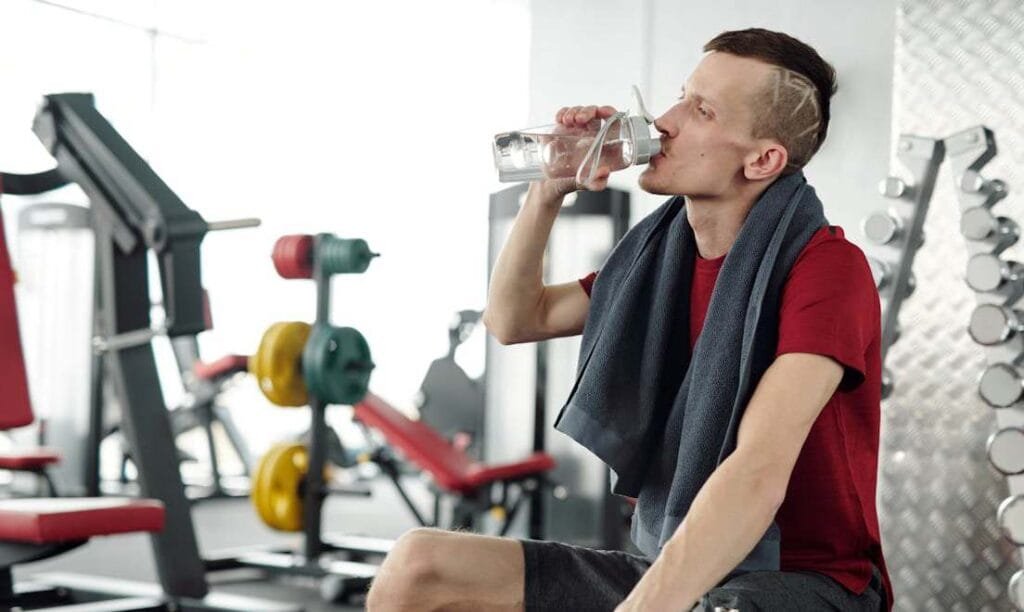Being an experienced exercise enthusiast, I have come to realize how important it is to maintain hydration during exercises. The significance of this in regards to physical fitness cannot be overemphasized. This aspect leads to better performance, recovery and general health. Below are some ways how you can stay adequately hydrated through your entire workout.
The Importance of Hydration During Exercise
It is essential to understand why it’s so important to drink water when you exercise. The human body is made up of 60% water, which means that without it a person cannot live.
Water plays an enormous part in nearly all systems in the body starting from muscles and going up to the cardiovascular system and brain.
It is essential for good hydration supporting the functions of fluid balance that includes nutrient and oxygen transportation, blood volume and pressure regulation, tissue/joint protection/lubrication as well as temperature control within the body.

Hydration and Performance
To optimize athletic performance, hydration is significant. The study has shown that even a dehydration limit of 2 per cent can impair endurance activities like cycling or running. Besides, dehydration may affect anaerobic capability in weightlifting, plyometrics, or HIIT workouts.
Risks of Dehydration
Dehydration is the loss of body water which can have serious consequences for your health. It puts you at risk of heat injury, urinary tract infections and kidney problems, fits and hypovolaemic shock- a condition with low blood pressure and inadequate oxygen in the body.
Recognizing Dehydration
How will I know if I’m not hydrating well? Even mild signs of dehydration can keep you from reaching your goals and performing at your best during exercise.
Some common symptoms include having a dry mouth or tongue, thirstiness, dizziness when standing up quickly or moving suddenly between sitting and standing positions, severe headache pain due to muscle weakness, fatigue; dry skin feeling light-headedness while having difficulty thinking clearly; dark yellow urine5.
In the most severe cases, there may be low blood pressure; the eyes appeared “sunken”; no tears/sweat was visible on their bodies; rapid heartbeat caused shallowness which led to coma.
Determining Your Hydration Needs
It’s a bit of an experiment to determine how much water you need. Nevertheless, the best way to hydrate will depend on your own particular body, exercise routine and even where you live. To start with; take your weight in pounds, divide it by two and that would be the minimum number of ounces of water per day if not exercising6. Then use the instructions below to better hydrate.
How to Hydrate for Exercise
In case you’re planning an intense workout or taking a hot yoga class, your hydration strategy might have to change slightly. “A lot of people are constantly dehydrated including high-class athletes. You must remain hydrated throughout the day to perform at optimal levels during workouts,”.
Several factors such as duration and intensity of workouts, level of fitness, clothing worn during exercise and climatic conditions in addition to altitude changes can affect sweat rates and thus fluid needs before, during and after exercising.
Best Practices for Hydration
If you are thinking of the best ways to hydrate, it is good that through sipping steadily every five to ten minutes at your workout time and after would be a good way.
Additionally, taking too much water before training may cause you to feel uncomfortable due to water splashing in your stomach. On the other hand, drinking more than enough fluids until hyperhydration sets in can have severe health consequences.
How to Hydrating Before, During, and After a Workout
Before Workout
Drink at least 2-3 cups of fluid (water and electrolytes) within two hours prior to a workout11. Drink 16-24 oz during that time period then drink another 8-16 oz 15 minutes before starting a workout.
During Workout
Take 16 – 32 oz per half hour or per hour of exercise. If someone sweats profusely, works out in intense conditions such as hot weather or high altitudes or intends to go for a long workout; then they should lean towards the higher end of this range.
After a Workout
Post-workout rehydration is as important as your cool-down stretch and active recovery days. After a moderate 30 to 60-minute sweat session, simply resume your regular eating and drinking patterns.
Do I require Electrolytes?
Electrolytes are significant for performance”. Sodium and potassium are electrolytes contained in sports drinks or powdered hydration packets, but can also be found in food. When we add sodium to beverages like electrolyte packets or sports drinks it increases our thirst response stimulating us to drink more thus fully rehydrating ourselves.
Also Read: How to Incorporate Yoga into Your Daily Routine for Better Flexibility?
Conclusion
In order to have proper performance during your workouts, recover well and maintain good health, it is important for you to stay reasonably hydrated. You can be certain of maintaining adequate hydration levels by adhering to such recommendations given by professionals. This will help you get the most out of your exercises and achieve the goals of improving your physical fitness.